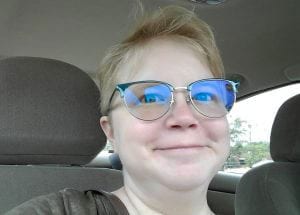Note: The author does hold immense compassion for children and teens and their families living with rare disease. Compassion is empathetic in sorrow, rather than wishing there is no sorrow, as feeling sorry denotes.
In a sentence: I was a child living with rare disease. I was a child when I lived with cancer.
And I didn’t feel sorry for myself when I was a child.
In fact, it only confused me and caused feelings of awkwardness and discomfort when adults made comments like “I wish I could take away your medicine for you,” or “I wish you didn’t have to live like this.” Or overhearing “be thankful for your life [insert name here] because you could have what Rebekah has.”
Did they really think they could live their lives while taking the medicine treatment I took? Were they suggesting I’d be better off dead because if I didn’t live “like this” I wouldn’t be around to feel sorry about, now would I?
I am now a thirty-something adult living with the same rare disease and living post cancer. I still don’t feel sorry when I see kids with my rare disease or kids undergoing treatment get paraded out in front of those who have money to fund cures and treatments, or those kids whose faces grace the literature for their disease and medication.
What I do feel sorry for is that magical change that happens once the child with the rare disease becomes the adult with the rare disease.
We listen to the parents of children and teens living with rare disease as they discuss the stresses on family insurance, medical access, job security, and how their relationships are affected. We listen. And when we open up our mouths….we get interrupted.
And we are you, parent of a child or teen with a rare disease. We are your age or older. Some of us even have our own marriages or partners and kids.
We shoulder the burdens our parents did before us, like you. Except we are often alone, unless our parents are well while aging and have continued involvement in our lives and/or we have a consistent relationship with the adults who reared us.
Rarely is a parent or other able-bodied adult going to approach us, their peers, and think they are just like us. They think of us as the kid and teen who already went through hell– so our reserves of courage and resilience are in large stores to get us through adulthood.
But maybe those reserves are depleted because of the years of being known as the ‘sick kid’ or ‘inspiring teen’ have taken their toll. Maybe we are tired. Tired of having to stay inspirational and motivational so that hope can be felt by all who look upon us. Tired of feeling the pressure to be alive and have a full-time job with medical benefits, to be enrolled in a secondary institution, to be in a relationship, to have children, to get to our medical appointments, and have a hobby all while maintaining medical treatment. No one can do this despite their illness; a person does this because of their illness and because they are still a human being who has to take place in society.
As a child or teen, one can make up schoolwork and focus on treatments and hospitalizations while adults living in the home are going to work to pay medical bills. From Kindergarten to 12th grade, one has a group of friends who also live with dependents, because able-bodied children and teens live that way too.
As an adult, this all changes. Think of all that gets you in the adult daily grind and add advocating for your own medical needs in addition to your job and maintaining that relationship with your partner and/or kids. We need resources and community and parents and able-bodied peers who encourage us like they already do each other; we don’t need you to treat us like kids with rare disease.
Some rare diseases have one or two organizations that help families. Because I am part of the cystinosis community, I know Cystinosis Research Foundation and Cystinosis Research Network both are organizations for families and their children. CRN even commissioned an Adult Leadership Advisory Board made up of adults living with cystinosis who mentor youth in their community.
To date, there is no organization within the cystinosis community specifically geared towards adult patients and their needs.
Realities of adults living with cystinosis are varied and it is okay when another person living with your diseases faces different issues than yourself. Adults living with a rare disease need a separate support group for:
- Community beyond their family of origin
- Mental/emotional support (and not just from professionals)
- Self-advocacy tips surrounding pharmacies, doctors, and insurances
- Support systems
- Sex/family education
- Job and career education
But one will not see the adults living with rare disease representing their rare disease community, unless they are doing it alone. And several individuals have solo projects. Because there is no group representing us. When an adult with a rare disease talks, it is for the benefit of the children and parents, not to join the parents in the conversation and pull the community together to advocate for all.







